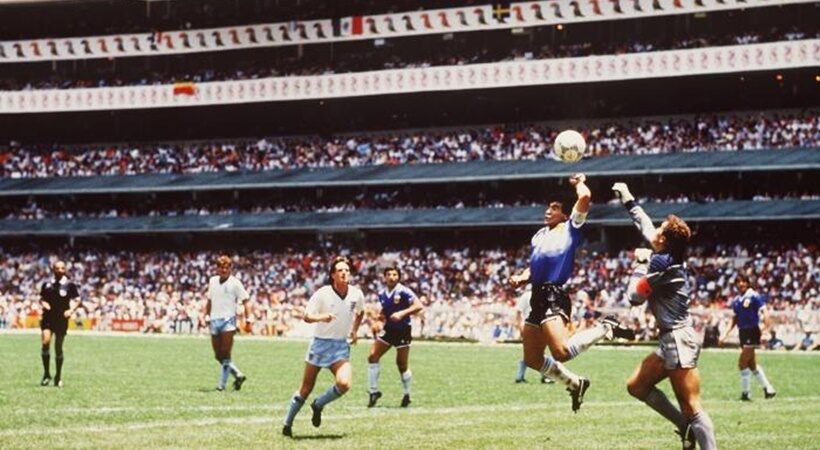As Diego Maradona’s jersey, which he wore during the famous “Hand Of God” episode, goes under the hammer, we can’t help but reminisce about the most important chapter in the history of the beautiful game. There are debates regarding the fairness of the episode and several theories justifying the act of Maradona. So, to put things in perspective first let us revisit an important incident in the football world and understand what it meant to the Argentinians.
The “Hand Of God” Incident
The Argentine Football Legend is no more amongst us as he passed into history at the age of 60 in the year 2020. But the great legacy of the legend is still very much intact and nobody can forget that it was Maradona, who helped Argentina lift the World Cup in 1986 despite having a very ordinary team in the Mexican affair. Interestingly, while talking about the legacy of Maradona, it would be a grave injustice to leave out the “Hand of God” episode. On June 22 1986, as Argentina locked horns with England in the quarterfinal of the Mexico World Cup an incident unfolded that altered the course of the game.
After being a goal-less encounter for the better part of the first half a golden opportunity came for Argentina to score in the 51st minute of the game. The ball was gradually heading towards the goalpost of England and Maradona was chasing it vigorously. As the goalkeeper Peter Shilton tried to grab the ball Maradona jumped to head the ball towards the net but ended up hitting the ball with his hand racing it past the goalkeeper to find the net. With no technology being used those days, the goal was termed legal and Argentina eventually won the match 2-1, courtesy of the “Hand” incident and goal of the century four minutes later.
Afterwards, when an English reporter asked Maradona about the role of his hand in the crucial match, the Argentine cheekily replied that “A little with the head of Maradona and a little with the hand of God”. Thus a new phenomenon called the “Hand Of God” made its way into soccer folklore.
What Did The Referee Say?
After the goal, the official commentators were unanimous that it will be disallowed by the referee. The English players also complained to the referee regarding the legality of the goal. However, the Tunisian referee Ali Bin Nasser, officiating for the match, ruled the goal in favour of Argentina as he felt it was in line with FIFA guidelines.
“I was hesitant at first, I glanced over to Dochev (Asst Referee), who was headed back to the centre of the pitch, confirming the goal. He didn’t signal for handball. The instructions Fifa gave us before the game were clear – if a colleague was in a better position than mine, I should respect his view. If Fifa had put a referee from Europe in charge of such an important game, the first goal of Maradona would have been disallowed. To me, that was 100% a goal according to FIFA guidelines,” Nasser responded to the goal years after the incident.
A Revenge For A Bloody Conflict
In 1982, Argentina and England were involved in a brief but bloody conflict over the Falkland Islands, known in Argentina as Las Malvinas. Several Argentinians, including Diego Maradona, were furious over their country’s defeat, and the killings of over 600 Argentinian soldiers, many of them happened to be young conscripts.
With no fair resolution in sight, football turned into a tool to avenge the injustice. Hence, in the 1986 World Cup, it was apparent that there was no love lost between Argentina and England. In fact, Maradona, later on after the match, skillfully termed the “Hand of God” incident as “picking the pocket of an Englishman” and “symbolic revenge” for the 1982 conflict.
“Of course I know that’s stupid but that’s how we felt and it was a feeling stronger than us all. “We were defending our flag, our children,” an emotionally charged Maradona said back then.



















